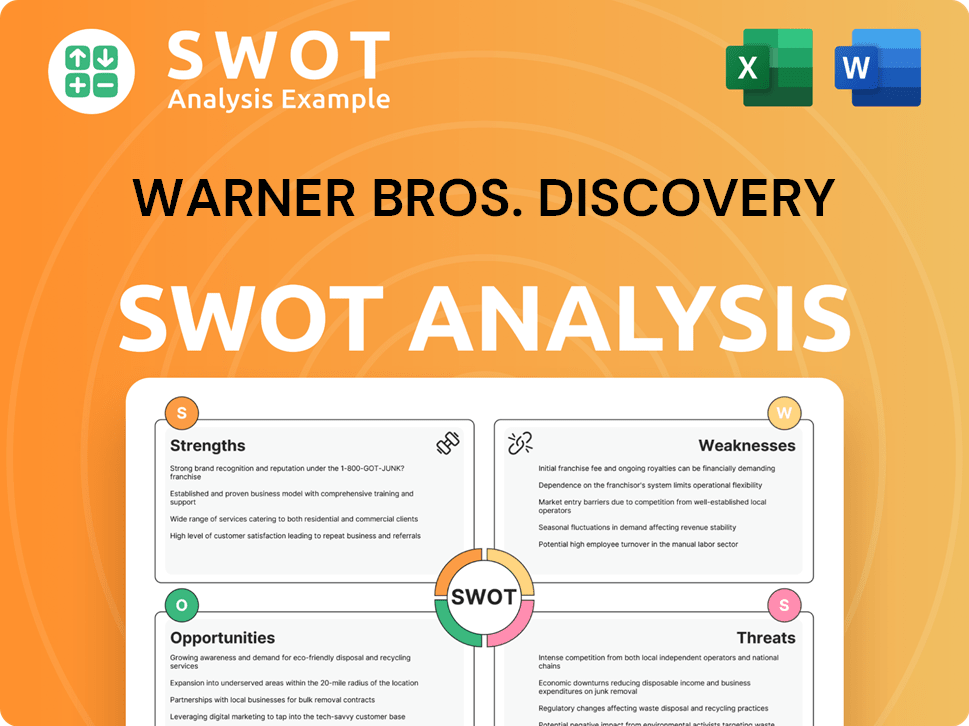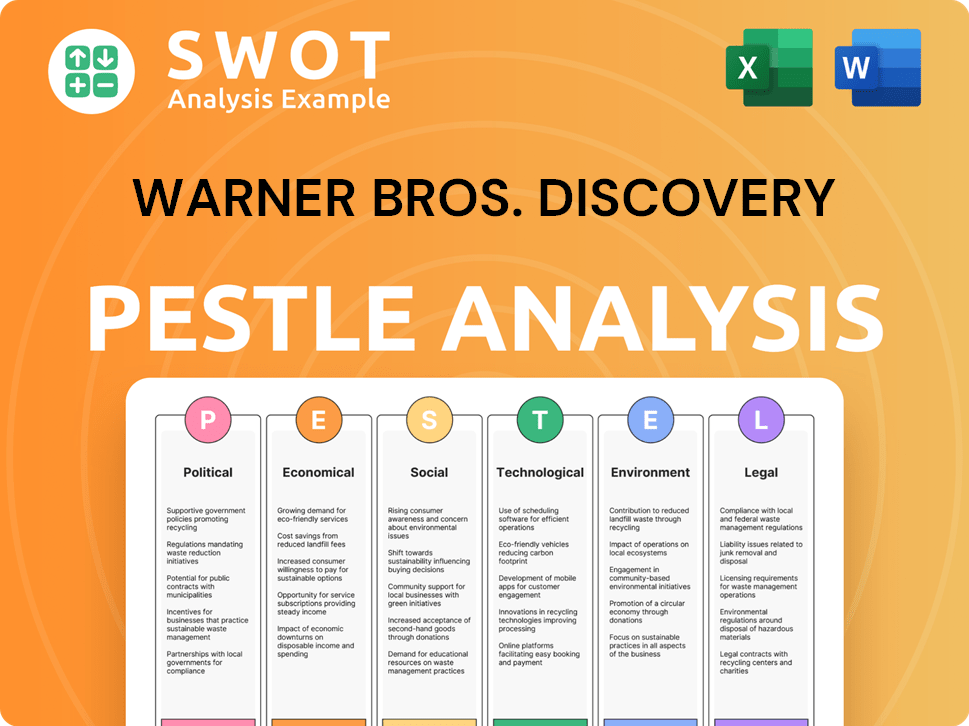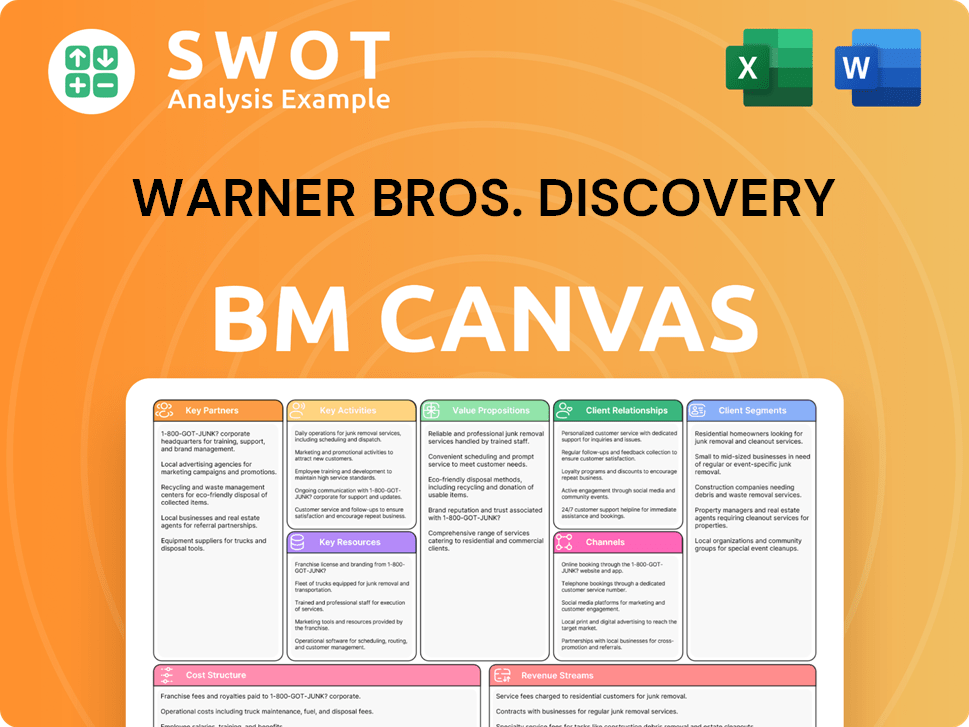Warner Bros. Discovery Bundle
Who Really Calls the Shots at Warner Bros. Discovery?
In the ever-evolving world of media, understanding the ownership structure of a giant like Warner Bros. Discovery is paramount. The 2022 merger that birthed this media conglomerate reshaped the entertainment landscape, making it essential to know who controls its destiny. Unraveling the Warner Bros. ownership reveals the forces driving its strategic decisions and market positioning.

The creation of Warner Bros. Discovery, a media powerhouse born from the union of WarnerMedia and Discovery Inc., has significantly impacted the industry. This deep dive into Warner Bros. Discovery SWOT Analysis will explore the company's ownership, from its foundational elements to its current structure, revealing the key players and their influence. Examining the Warner Bros. Discovery merger details and the company's history provides crucial insights into its future, including its financial performance, market share, and the individuals who shape its direction, such as the CEO of Warner Bros. Discovery and the rest of the leadership team.
Who Founded Warner Bros. Discovery?
The current ownership structure of Warner Bros. Discovery is complex, stemming from a merger rather than a traditional founding. To understand the ownership, it's important to look at the origins of its main predecessors: WarnerMedia and Discovery, Inc.
Warner Bros. Entertainment's roots trace back to 1923 with the founding of Warner Bros. Pictures, Inc. by the Warner brothers: Harry, Albert, Sam, and Jack. Discovery, Inc., on the other hand, was established in 1985 as Cable Educational Network by John Hendricks.
The merger that created Warner Bros. Discovery reshaped the ownership landscape, bringing together these two media giants.
The Warner brothers, Harry, Albert, Sam, and Jack, founded Warner Bros. Pictures, Inc. in 1923. They each held distinct roles in the company's early operations.
John Hendricks founded Cable Educational Network in 1985, which later became Discovery, Inc. He played a key role in shaping the company's direction.
Early investors supported both Warner Bros. and Discovery, Inc., though specific details from the early years are not always readily available.
The Warner brothers' vision of a vertically integrated film company was crucial to their early ownership and control. This included production, distribution, and exhibition.
Discovery's founding team aimed to create a leading non-fiction media company, influencing its early investment and ownership agreements.
Discovery, Inc. evolved through various stages of ownership, including a period under Liberty Media, before becoming a publicly traded company.
The formation of Warner Bros. Discovery involved a merger between WarnerMedia (formerly owned by AT&T) and Discovery, Inc. This transaction, which closed in April 2022, resulted in a new publicly traded company. As of early 2024, the largest shareholders include institutional investors. Understanding the target market of Warner Bros. Discovery is essential for analyzing the company's strategic direction and financial performance. The merger created a media conglomerate with a vast portfolio of brands and content, influencing its market share and financial results. The company's structure and executive leadership are key factors in its ongoing operations and strategic decisions.
Warner Bros. Discovery SWOT Analysis
- Complete SWOT Breakdown
- Fully Customizable
- Editable in Excel & Word
- Professional Formatting
- Investor-Ready Format

How Has Warner Bros. Discovery’s Ownership Changed Over Time?
The ownership of Warner Bros. Discovery (WBD) has been significantly shaped by a pivotal merger. This began on April 8, 2022, when WarnerMedia, previously a subsidiary of AT&T, merged with Discovery, Inc. This transaction was structured as a Reverse Morris Trust, a strategic move designed for tax efficiency. The merger resulted in AT&T shareholders holding approximately 71% of the new entity, while Discovery shareholders held the remaining 29%.
Before the merger, WarnerMedia was under AT&T's control, having been acquired in 2018. Discovery, Inc. was already a publicly traded company. The restructuring aimed to streamline operations and capitalize on content creation and streaming services. This shift from direct corporate control to a publicly held structure has influenced the company's strategic direction, which is focused on content creation, streaming expansion, and debt reduction.
| Event | Date | Impact on Ownership |
|---|---|---|
| AT&T Acquisition of WarnerMedia | 2018 | WarnerMedia became a subsidiary of AT&T. |
| Merger of WarnerMedia and Discovery, Inc. | April 8, 2022 | AT&T shareholders received 0.241917 shares of Warner Bros. Discovery common stock for each share of AT&T common stock they owned, resulting in AT&T shareholders owning 71% of the new company, and Discovery shareholders owning 29%. |
| Ongoing Public Trading | Early 2024 | Significant institutional ownership, including Capital Research Global Investors, The Vanguard Group, and BlackRock. |
As of early 2024, Warner Bros. Discovery's ownership is largely distributed among institutional investors and public shareholders. Major stakeholders include Capital Research Global Investors, The Vanguard Group, and BlackRock. For example, Capital Research Global Investors held approximately 11.52% of the company as of March 31, 2024. The Vanguard Group Inc. held about 9.07%, and BlackRock Inc. held around 7.44%. The CEO, David Zaslav, also has a notable individual stake. This shift towards broad public ownership is typical for major publicly traded corporations, influencing the company's strategic focus, as highlighted in the Marketing Strategy of Warner Bros. Discovery.
The ownership of Warner Bros. Discovery has evolved significantly since the merger in 2022, with institutional investors now holding major stakes.
- AT&T shareholders initially held a majority stake after the merger.
- Capital Research Global Investors, The Vanguard Group, and BlackRock are major institutional investors.
- The company is now primarily held by public shareholders and institutional investors.
- David Zaslav, the CEO, holds a significant individual stake.
Warner Bros. Discovery PESTLE Analysis
- Covers All 6 PESTLE Categories
- No Research Needed – Save Hours of Work
- Built by Experts, Trusted by Consultants
- Instant Download, Ready to Use
- 100% Editable, Fully Customizable

Who Sits on Warner Bros. Discovery’s Board?
The Board of Directors of Warner Bros. Discovery (WBD) is pivotal in the company's governance, reflecting its ownership structure. As of early 2024, the board includes a mix of independent directors and those with ties to the pre-merger entities, such as Discovery, Inc. and appointees from the merger. David Zaslav serves as the Chief Executive Officer and a director. This media conglomerate operates under a typical one-share, one-vote structure for its common stock, which is standard for publicly traded companies. Understanding the composition of the board is crucial for anyone interested in Growth Strategy of Warner Bros. Discovery.
The board's decisions are closely monitored by major shareholders, particularly concerning debt reduction, streaming strategy, and content investment. The board's composition aims to bring diverse expertise and perspectives to navigate the competitive media landscape. The influence of major institutional shareholders is evident through their voting power on board nominations and significant corporate actions. Proxy battles or activist investor campaigns haven't been a dominant feature recently, due to the company's relatively recent formation and focus on integration post-merger. The board's role is critical in guiding Warner Bros. Discovery's strategic direction.
| Board Member | Title | Affiliation |
|---|---|---|
| David Zaslav | President, CEO, and Director | Warner Bros. Discovery |
| Lachlan Murdoch | Director | Independent |
| Steven Newhouse | Director | Independent |
The board includes independent directors and executives from pre-merger entities. David Zaslav leads as CEO and director. Major shareholders influence decisions through voting power.
- The board's composition brings varied expertise to guide the company.
- The focus is on strategic execution and debt reduction.
- The board structure reflects the company's focus on long-term growth.
Warner Bros. Discovery Business Model Canvas
- Complete 9-Block Business Model Canvas
- Effortlessly Communicate Your Business Strategy
- Investor-Ready BMC Format
- 100% Editable and Customizable
- Clear and Structured Layout

What Recent Changes Have Shaped Warner Bros. Discovery’s Ownership Landscape?
The most significant shift in the ownership of Warner Bros. Discovery (WBD) over the past few years stems from its formation in April 2022. This came about through the merger of WarnerMedia and Discovery, Inc., fundamentally altering its ownership structure. WarnerMedia transitioned from being a wholly-owned subsidiary of AT&T to a publicly traded entity with a diverse shareholder base. This change has reshaped the landscape of the media conglomerate.
Post-merger, a primary focus has been on reducing the company's debt. As of the end of 2023, the debt load was approximately $43.2 billion. This financial strategy indirectly influences ownership as it impacts the company's financial health and stock performance, making it more attractive to investors. The company's approach to its streaming services, such as Max (formerly HBO Max), and content investments are closely monitored by owners. Strategic decisions regarding these areas can significantly affect the company's financial outlook and, consequently, its appeal to shareholders.
| Metric | Value | Year |
|---|---|---|
| Debt (approximate) | $43.2 billion | 2023 |
| Institutional Ownership | Significant | Ongoing |
| Merger Date | April 2022 | 2022 |
Institutional investors, including firms like Capital Research Global Investors, Vanguard, and BlackRock, hold substantial stakes, reflecting a broader industry trend. This concentration of ownership by institutional investors often leads to an increased emphasis on financial performance and shareholder returns. The company's strategic decisions regarding its streaming services and content investments are closely watched by its owners. For a broader view on its competitors, consider reading about the Competitors Landscape of Warner Bros. Discovery.
The ownership structure of Warner Bros. Discovery is primarily influenced by institutional investors. These investors hold a significant portion of the shares, guiding the company's strategic decisions. The merger in 2022 also played a crucial role in shaping its current ownership.
Major institutional investors such as Capital Research Global Investors, Vanguard, and BlackRock hold substantial stakes. These entities significantly influence the company's direction and financial strategies. Their involvement is a key aspect of understanding who owns Warner Bros.
A key financial strategy is debt reduction, with approximately $43.2 billion in debt as of late 2023. This focus on deleveraging impacts investor confidence and the company's stock performance. The financial health of the company is a primary concern for the owners.
The company's future may involve strategic partnerships or divestitures. The streaming segment, including Max, is a key area of focus for profitability. These decisions will further shape the ownership landscape. The focus is on long-term value creation.
Warner Bros. Discovery Porter's Five Forces Analysis
- Covers All 5 Competitive Forces in Detail
- Structured for Consultants, Students, and Founders
- 100% Editable in Microsoft Word & Excel
- Instant Digital Download – Use Immediately
- Compatible with Mac & PC – Fully Unlocked

Related Blogs
- What are Mission Vision & Core Values of Warner Bros. Discovery Company?
- What is Competitive Landscape of Warner Bros. Discovery Company?
- What is Growth Strategy and Future Prospects of Warner Bros. Discovery Company?
- How Does Warner Bros. Discovery Company Work?
- What is Sales and Marketing Strategy of Warner Bros. Discovery Company?
- What is Brief History of Warner Bros. Discovery Company?
- What is Customer Demographics and Target Market of Warner Bros. Discovery Company?
Disclaimer
All information, articles, and product details provided on this website are for general informational and educational purposes only. We do not claim any ownership over, nor do we intend to infringe upon, any trademarks, copyrights, logos, brand names, or other intellectual property mentioned or depicted on this site. Such intellectual property remains the property of its respective owners, and any references here are made solely for identification or informational purposes, without implying any affiliation, endorsement, or partnership.
We make no representations or warranties, express or implied, regarding the accuracy, completeness, or suitability of any content or products presented. Nothing on this website should be construed as legal, tax, investment, financial, medical, or other professional advice. In addition, no part of this site—including articles or product references—constitutes a solicitation, recommendation, endorsement, advertisement, or offer to buy or sell any securities, franchises, or other financial instruments, particularly in jurisdictions where such activity would be unlawful.
All content is of a general nature and may not address the specific circumstances of any individual or entity. It is not a substitute for professional advice or services. Any actions you take based on the information provided here are strictly at your own risk. You accept full responsibility for any decisions or outcomes arising from your use of this website and agree to release us from any liability in connection with your use of, or reliance upon, the content or products found herein.